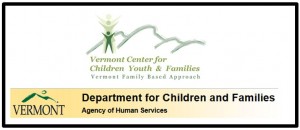A new combined effort between the Vermont Department of Children and Families (DCF), the Vermont Department of Mental Health, and the Child & Adolescent Psychiatry Fellowship Program at the Vermont Center for Children, Youth, and Families (VCCYF) will support caseworkers who often need to make complex medical decisions regarding the children under their care.
While it has been well known that the number of youth who take antipsychotic medication has been increasing nationwide, the rate tends to be about five times higher among youth in state custody. Antipsychotic medications can be an important component of treatment for some, yet these medications also carry the potential for serious risks and side effects including movement disorders, obesity, diabetes, and high cholesterol. When kids enter state custody, DCF caseworkers become responsible for consenting to these and any other medications and medical decisions. This responsibility can be a challenge due to the large caseloads of the social workers and the fact that these children often move around to various placements around the state. Unlike most parents, DCF caseworkers are often unable to attend physician appointments with their children which is where the risks and benefits of medications are typically discussed. DCF caseworkers are also not clinically trained in pharmacology.
To support DCF caseworkers in this challenging task, a new program will begin next month that will help them in deciding whether or not a antipsychotic medication that is being considered for a child in custody is appropriate. This includes the following:
1. Additional training provided to the caseworkers about antipsychotic medications and their potential risks and benefits.
2. A more rigorous written informed consent process that will be required between the DCF caseworker and prescribing clinician to ensure that children in DCF custody who are being prescribed antipsychotics are getting these medications for the right reasons and being monitored according to best practice guidelines.
3. The opportunity for caseworkers who may have questions or concerns about the consideration of antipsychotic medications for one of their clients to get an independent opinion from one of the child psychiatry fellows in the VCCYF training program who is supervised by UVM child psychiatry faculty. These free consultations can occur whenever the caseworkers would like one and are required in certain situations (such as a child under six years old).
The project has been led at DCF by Cindy Walcott, Deputy Commissioner for Family Services. We are excited to be part of this effort both to help make sure these vulnerable children are getting the best care possible and to give our child psychiatry fellows a valuable educational experience. Vermont has already seen a decrease in the use of antipsychotic prescriptions among youth over the past several years. Improving access to evidence-based psychotherapy for oppositional and aggressive children, educating prescribers on when and how to reduce or discontinue these medications when appropriate, enhancing the flow of medical information between different practices, and using technology to remind physicians about the need for regular labwork can all help the prescribing of this class of medications to be closer to best practice recommendations.
The new policy begins on July 1. Primary care clinicians who prescribe antipsychotic medications to children in DCF custody can expect to be asked to complete this informed consent process with the child’s caseworker over the next few months.
Tags: antipsychotic, dcf, psychotropic


